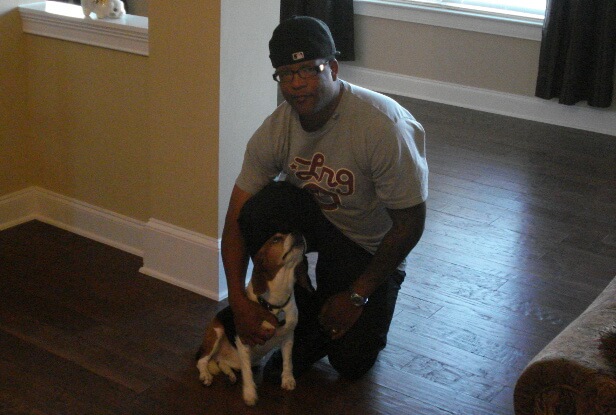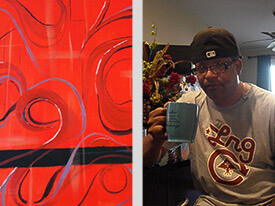November 06, 2013
By Phillip Unknown

Growing up was really tough because I always felt that there was something different about me, but I was too afraid to face it. If I had known what I do now, I could have easily skipped the dark years, which involved lots of self-destruction with heavy drug usage and self-harm. I wasn’t the type of kid that could deal with being punished because I punished myself more than anyone else ever could. That’s where cutting played a huge role because when I would get punished, I felt that I had to harm myself just to prove to myself that my punishment was more severe. Kids shouldn’t think like that. Now I am an adult and I’ve learned what it’s like to live with bipolar disorder and later, posttraumatic stress disorder (PTSD).
“As long as there is war, there will be soldiers who need to talk to someone, so I’m trying to be that conduit …
I self-medicated for many years to deal with the highs and lows of living with bipolar disorder. That didn’t go over so well. I lost my apartment, my car, my health and my self-worth. I got somewhat of a diagnosis shortly after I joined the Army in 1999, but I was only given medicine to fight the broad symptoms of bipolar disorder without any fine-tuning. I figured joining the Army would solve everything. And while it helped a lot, I still wasn’t letting go of all my baggage. All my issues ended up catching up with me and I started having really bad manic episodes. I thought everyone was against me and wanted to see me fail, so just about everyone was a potential enemy. Mixing those manic episodes with tons of alcohol really wasn’t the greatest idea and it put me over the edge.
I left Fort Carson in Colorado to go to Iraq in 2003. I didn’t really care much about my life, so while I was positive that I would die there, I was OK with it. When I didn’t die, it sent me into a panic. I went on to Korea after that and all the symptoms of PTSD started to appear. I never noticed anything—my wife was the one who caught it. Things like screaming at night, cold sweats and waking up every hour were just a few of my issues that she helped point out. Sometimes I would have an angry outburst and the next second I’d be in tears.
My mental health records were lost when I went from Fort Carson to Korea, so I had to wait until 2007 to receive a diagnosis. However, it came at the perfect time because for once I was trying to be serious about mental illness and actually take my meds on time. It’s been a rocky road, but finding NAMI is what made the lasting changes in my life. Since joining NAMI in 2010 I have completed NAMI Peer-to-Peer training, become a facilitator and now present for NAMI’s In Our Own Voice (IOOV). Many soldiers and veterans have approached me after my presentations and asked me how to get involved with NAMI, but at the same time told me how they felt all alone with their illness and terrified of letting anyone know they needed help. Hopefully the more I present, the more they will feel comfortable opening up.
 But the icing on the cake has been becoming the NAMI Columbus’ Director of Military Affairs at Fort Benning, Ga. It has always been one of my passions to help soldiers with mental illness. We all know that PTSD is running freely through our military as war lingers on. As long as there is war, there will be soldiers who need to talk to someone, so I’m trying to be that conduit at Fort Benning. As with anything new, it has been a slow start but I’m still determined because I could be the reason a soldier doesn’t take his or her own life or get mixed up with drugs or domestic violence.
But the icing on the cake has been becoming the NAMI Columbus’ Director of Military Affairs at Fort Benning, Ga. It has always been one of my passions to help soldiers with mental illness. We all know that PTSD is running freely through our military as war lingers on. As long as there is war, there will be soldiers who need to talk to someone, so I’m trying to be that conduit at Fort Benning. As with anything new, it has been a slow start but I’m still determined because I could be the reason a soldier doesn’t take his or her own life or get mixed up with drugs or domestic violence.I also have been an artist my entire life and I really hope to get accepted into more galleries someday. Art is what helps me to relax. It’s something I’ve been able to turn to instead of self-medicating with alcohol. Painting has been very rewarding over the years, but I don’t feel that I have made it quite yet. My art is like my connection with NAMI: I learn something new every session and I get better each time I go back.
NAMI really helped me to be social again. I used to just stay inside all day and play video games but now my day isn’t complete if I don’t go out and do something. I’ve met a lot of very warm-hearted people through NAMI. The first time I ever went to a meeting, I found people just like me and that went a long way. Now I’m trying to give back to NAMI what it gave to me.
We’re always accepting submissions to the NAMI Blog! We feature the latest research, stories of recovery, ways to end stigma and strategies for living well with mental illness. Most importantly: We feature your voices.
LEARN MORENAMI HelpLine is available M-F, 10 a.m. – 10 p.m. ET. Call 800-950-6264,
text “helpline” to 62640, or chat online. In a crisis, call or text 988 (24/7).